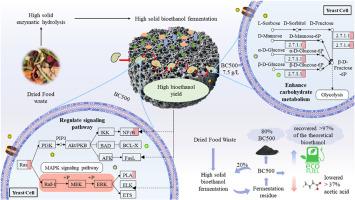Efficiency and transcriptomic analysis reveal the mechanism of fermentation residue biochar and dosage on enhancing food waste high solid bioethanol fermentation
IF 9.7
1区 环境科学与生态学
Q1 ENGINEERING, ENVIRONMENTAL
引用次数: 0
Abstract
Recovering bioethanol from food waste offers dual benefits of mitigating pollution and producing clean, renewable energy. High solid bioethanol fermentation enhances process sustainability and economic viability, however, hindered by decreased bioethanol yield and limited fermentation residue valorization methods. In this study, the bioethanol fermentation residue was used to produce biochar, which was incorporated into the food waste high solid bioethanol fermentation system to improve process efficiency. The BC produced at 500 °C (BC500) has highest SBET, with obvious adsorptions observed both on the surface and within the pores. The addition of BC500 increased the bioethanol yield by 14.93% and reduced acetic acid concentration by 37.58%. Increasing the BC500 dosage to 7.5 g/L reached the highest bioethanol concentration of 75.11 g/L (97.56% of the theoretical value), and 38.51% increase in bioethanol yield. The transcriptomic revealed that the BC500 enhanced bioethanol yield by regulating gene expression and enhancing signaling pathways. BC500 provided abundant attachment sites, significantly upregulating the expression of gene SIPA1L2 and MTMR3/4, and upgraded Ras and MAPK signaling pathway of Saccharomyces cerevisiae. These changes promoted cell cycle progression and proliferation, while limiting autophagy and cell death. The optimum BC500 dosage (7.5 g/L) could provide a more stable environment for signal transduction and enhance carbohydrate metabolism. The research enhanced food waste bioethanol conversion efficiency, realize zero discharge of fermentation residues, which advancing the sustainable development and clean production of high solid bioethanol fermentation technology.


求助全文
约1分钟内获得全文
求助全文
来源期刊

Journal of Cleaner Production
环境科学-工程:环境
CiteScore
20.40
自引率
9.00%
发文量
4720
审稿时长
111 days
期刊介绍:
The Journal of Cleaner Production is an international, transdisciplinary journal that addresses and discusses theoretical and practical Cleaner Production, Environmental, and Sustainability issues. It aims to help societies become more sustainable by focusing on the concept of 'Cleaner Production', which aims at preventing waste production and increasing efficiencies in energy, water, resources, and human capital use. The journal serves as a platform for corporations, governments, education institutions, regions, and societies to engage in discussions and research related to Cleaner Production, environmental, and sustainability practices.
 求助内容:
求助内容: 应助结果提醒方式:
应助结果提醒方式:


